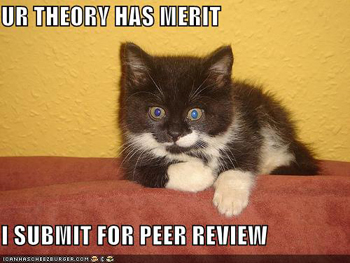
It has seemed to me for some time now that the landscape of news and information sources has changed since the end of the last century. Anecdotally, I seem to know an awful lot of people who rely primarily on online sources (both online versions of traditional newspapers and magazines and blogs with journalistic leanings that provide solidly researched articles and deep analysis) for their news. But I also seem to know some people who automatically equate information on the internet with the nutty website of a paranoid guy in the cellar.
And it’s really hard to assume that the people I seem to know are a representative sample of the population as a whole.
In the interests of science (what with the penchant for empirical evidence), some folks are trying to get some data on who is reading about science in the blogosphere and about what impact, if any, blogs may be having in the three-dimensional world. To that end, they’ve constructed a survey which you are invited to take. Here’s the official explanation:
This survey attempts to access the opinions of bloggers, blog-readers, and non-blog folk in regards to the impact of blogs on the outside world. The authors of the survey are completing an academic manuscript on the impact of science blogging and this survey will provide invaluable data to answer the following questions:
Who reads or writes blogs?
What are the perceptions of blogging, and what are the views of those who read blogs?
How do academics and others perceive science blogging?
What, if any, influence does science blogging have on science in general?
Please consider participating in the survey as an act of ‘internet solidarity’! It will likely take 10 minutes, and a bit more if you are a blogger yourself. We thank you in advance.
If you survive the survey unscathed, you might even email the link to a friend (although for goodness sake, don’t make a chain letter out of it!) to help build a larger and perhaps more representative sample.
The above LOLcat brought to my attention by RMD, who got to interview Cheezburger!

you neglected to mention who it is that is conducting this survey…..?
Yes, sorry — the survey is being conducted by Nick Anthis, Shelley Batts, and Tara C. Smith, academic-scince types (and science bloggers) working on a manuscript.
and ScienceBlogs(tm)-ers as well.
This is not a gotcha. It is another small point about the inadvertent way apparent conflicts in science arise. Not to mention problems with IRBs and the like. You start off thinking “well this is just a little internet survey, completely voluntary, so what’s the harm”. And then for the ultimate publication, what will the attribution line state? Will Seed or ScienceBlogs be the primary attribution? or will it be the respective Universities with the aforementioned attributions buried lower?
Surely you recognize how self serving this effort might be viewed?
Given that, issues of methodology are paramount. I’m not really in the survey biz but even I can spot a couple of major misses.
Unless, of course, this is for a popular press target in which case issues of methodology are unimportant…unless you work for an outfit which routinely excoriates popular press treatment of science that is.
My understanding of it is as follows:
1. Nick, Shelley, and Tara have been working on the manuscript on their own initiative, not as part of any ScienceBlogs or Seed project. I doubt that their respective universities have much involvement in the manuscript, either. I assume that those universities would be listed as their institutional affiliations on the manuscript, and I suspect they’ll disclose their Sb affiliation as well (since it seems relevant).
2. My understanding is that the intended audience is “academic” rather than “popular”.
3. As you note, the fact of the academic audience means that survey design may well become an issue.
4. As might IRB approval, or lack thereof.
5. My counsel was sought on none of these issues (and if it had been, I would have noted some of the very issues you noted). I *was* asked to spread the word about the survey. It looks non-harmful to the participant, and I’ll admit to some curiosity about what the responses will be. But I’m pretty agnostic about what conclusions they’ll be able to draw from them.